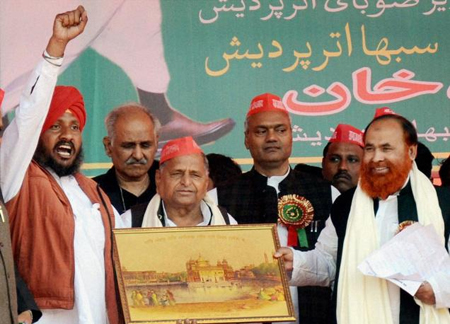
Lucknow, Mar 3: In a bid to re-affirm his commitment to the Muslim cause and allay fears of having an alliance with the Bharatiya Janata Party (BJP) in the backdrop of his recent statement in the Lok Sabha, Samajwadi Party chief Mulayam Singh has pulled out all stops to woo the minority community ahead of next year’s general election.
While reiterating his stand on the implementation of the Sachar Committee report and re-assuring the Muslims that he would talk to the Prime Minister again and raise the issue in the Lok Sabha, Mr. Singh slammed the Centre for its non-implementation. “If the Sachar report is not implemented the Delhi Government [United Progressive Alliance government) will have to go,” Mr. Singh declared.
Mr. Singh further sought to re-assure the minority community that the innocent Muslims who had been jailed (on charges of terrorism) and (against whom) no chargesheet had been filed “will no longer remain in jail.”
Chairs minorities’ meet
The Samajwadi Party president was the chief guest at the State-level Minorities Awareness Convention, organised by the Minorities Front of the party, and he chose the occasion to remove misgivings about his commitment to their cause. However, the “Muslim face” of the party and the government — Minorities Welfare Minister Mohammad Azam Khan — was conspicuous by his absence. It is alleged that he was not invited for the meeting by Haji Riaz Ahmed, chairman of SP Minorities Front and the convener of the conference. Mr. Khan and Mr. Ahmed are from the Muslim-dominated Rohilkhand region of Uttar Pradesh and allegedly don’t see eye-to-eye.
Addressing the well-attended convention at the Jhule Lal Park here on Saturday, the Samajwadi president sought to clarify his recent statement (on February 27) in which he reportedly said that if the BJP changed its views on Muslims, Babri Masjid and Kashmir (Special Status under Article 370 ), the gap between the SP and the BJP could be bridged.
Mr. Singh said he asked the BJP to spell out its stand on the Muslims, Kashmir and Ram temple, and why it did not accept the Muslims’ demands (Musalmano ki baat kyon nahin maan lete). In a bid to suggest that there was no convergence with the BJP, the SP chief mentioned his dinner meeting with the former Prime Minister Atal Bihari Vajpayee in which he asked Mr. Vajpayee to shun these issues. “Atalji remarked if the suggestion is accepted, then what will be left with the BJP,” Mr. Singh said. The SP president added that these issues had not been abandoned by the BJP.
Even as the former Uttar Pradesh Chief Minister reiterated that his party would continue to strive for the betterment of the minority community, he was critical of the UPA government dragging its feet on the Sachar Committee report. The committee was constituted by the Congress-led UPA government and the report had been submitted to the Prime Minister, but “no headway has been made.”
Welfare of Muslims
Mr. Singh outlined the steps taken for the welfare of the Muslim girls by the Akhilesh Yadav government and said that schemes for the uplift of backward Muslims had been launched. A proposal for including backward Muslims in the Scheduled Caste and Scheduled Tribe list would be sent to the Centre.
The convention was also addressed by Health and Family Welfare Minister Ahmed Hasan, Minister of State for Planning Fareed Mahfooz Kidwai and the SP national secretary Kamal Farooqui. They raised the issue of arrest of Muslim youths on terror charges.





Comments
Add new comment